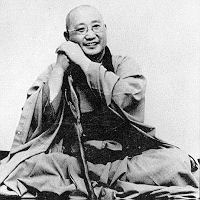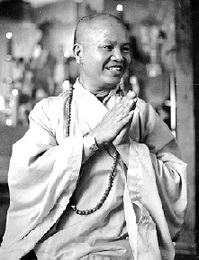Zen Master Seung Sahn (August 1, 1927-November 30, 2004)

Zen Master Seung Sahn (Daejongsanim) was born in Korea during the Japanese occupation, which he resisted during his youth. After World War II, disillusioned with politics and academic studies as a way to attain truth, he went to the mountains with the goal of finding his true self. At that time he did an arduous 100-day chanting retreat, during which he attained enlightenment. Afterwards his attainment was recognized by several Korean Masters, and he received Inga from Zen Master Kobong, an enigmatic Zen Master who refused to teach monks. Kobong Sunim told him, "Your Dharma mission is the whole world." In subsequent years, Daejongsanim worked to reorganize Korean Buddhism, then he left Korea for Japan, where he spent seven years, founding temples and teaching Zen.
Daejongsanim arrived in the United States in 1972 with the idea of seeing whether it was possible to teach Zen to Westerners. He had little money and no English. After spending a short time with the Korean community in Los Angeles, he went to Providence, Rhode Island where he took a job in a Laundromat, carrying laundry and repairing the machines. He met a professor of Buddhism from Brown University who introduced Daejongsanim to some of his students. They would come by Daejongsanim's small, slum apartment; Daejongsanim would cook for them, teach them meditation, and answer their questions about Zen practice and life. With his new students' help, Daejongsanim subsequently founded the Providence Zen Center, a large, residential Zen Center that has become the head temple to The Kwan Um School of Zen and more than five dozen Zen Centers around the world, including Dharma Zen Center in Los Angeles.
Daejongsanim had given Dharma Transmission to several of his Western students and Inga to some fourteen others. Zen Master Seung Sahn is the author of "The Compass of Zen", "The Whole World is a Single Flower - 365 Kong-Ans For Everyday Life", "Dropping Ashes on the Buddha", "Only Don’t Know", "Ten Gates" and "Bone of Space". Daejongsanim had always encouraged people of all faiths to realize their true nature together. For many years he has lead Zen retreats at the Abbey of Gethsemani and taught at several Ecumenical gatherings.
Daejongsanim arrived in the United States in 1972 with the idea of seeing whether it was possible to teach Zen to Westerners. He had little money and no English. After spending a short time with the Korean community in Los Angeles, he went to Providence, Rhode Island where he took a job in a Laundromat, carrying laundry and repairing the machines. He met a professor of Buddhism from Brown University who introduced Daejongsanim to some of his students. They would come by Daejongsanim's small, slum apartment; Daejongsanim would cook for them, teach them meditation, and answer their questions about Zen practice and life. With his new students' help, Daejongsanim subsequently founded the Providence Zen Center, a large, residential Zen Center that has become the head temple to The Kwan Um School of Zen and more than five dozen Zen Centers around the world, including Dharma Zen Center in Los Angeles.
Daejongsanim had given Dharma Transmission to several of his Western students and Inga to some fourteen others. Zen Master Seung Sahn is the author of "The Compass of Zen", "The Whole World is a Single Flower - 365 Kong-Ans For Everyday Life", "Dropping Ashes on the Buddha", "Only Don’t Know", "Ten Gates" and "Bone of Space". Daejongsanim had always encouraged people of all faiths to realize their true nature together. For many years he has lead Zen retreats at the Abbey of Gethsemani and taught at several Ecumenical gatherings.
Ven. Dr. Thich Thien-AN (September 1926-November 1980)

Ven. Dr. Thich Thien-An (September 1926 - November 1980) was an influential teacher and Buddhist monk of Vietnamese Zen Buddhism and was active in the United States from 1966 to 1980.Thích Thiên-Ân came to the United States from Vietnam in the summer of 1966 as an exchange professor. He taught philosophy at the University of California, Los Angeles. After discovering that he was not only a renowned scholar, but a Zen Buddhist monk, as well, his students convinced him to teach Zen meditation and to start a Buddhist study group on the UCLA campus.
A few years later, his enthusiastic students encouraged Thích Thiên-Ân to apply for permanent residence and open a meditation center that included a place for practitioners to live and study Zen Buddhism. In 1970, he founded the International Buddhist Meditation Center in the Koreatown section of Los Angeles, California .
Once established, Thích Thiên-Ân taught the traditions of Zen Buddhism at his center. In addition, he taught Eastern Philosophy and Asian Studies at Los Angeles City College, which is now Buddha Dharma University. He retired from teaching at the college when he was diagnosed with liver cancer in 1979. He continued teaching at his center until he died in 1980 at the age of 54, succumbing to the effects of the liver cancer.
The International Buddhist Meditation Center he founded continues to thrive.
Thích Thiên-Ân authored the following books: Zen Philosophy, Zen Practice and Buddhism and Zen in Vietnam
A few years later, his enthusiastic students encouraged Thích Thiên-Ân to apply for permanent residence and open a meditation center that included a place for practitioners to live and study Zen Buddhism. In 1970, he founded the International Buddhist Meditation Center in the Koreatown section of Los Angeles, California .
Once established, Thích Thiên-Ân taught the traditions of Zen Buddhism at his center. In addition, he taught Eastern Philosophy and Asian Studies at Los Angeles City College, which is now Buddha Dharma University. He retired from teaching at the college when he was diagnosed with liver cancer in 1979. He continued teaching at his center until he died in 1980 at the age of 54, succumbing to the effects of the liver cancer.
The International Buddhist Meditation Center he founded continues to thrive.
Thích Thiên-Ân authored the following books: Zen Philosophy, Zen Practice and Buddhism and Zen in Vietnam
